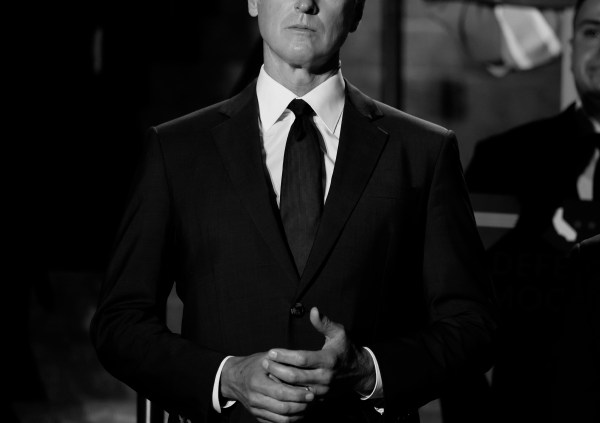With today marking the one-year anniversary of Russia’s full-scale invasion of its neighbor, whether Western backers will remain steadfast in supporting Ukraine is becoming a bigger question. Last week Florida Rep. Matt Gaetz, joined by 10 other House Republicans, introduced a “Ukraine Fatigue” resolution calling for an end to U.S. support to the embattled country.
Enter the For Country Caucus, a bipartisan group of veterans that since 2019 has met twice a month to workshop ways Congress can reclaim its role in crafting America’s foreign policy and national security agenda. The war in Ukraine has reinvigorated that effort.
“We often punt to the executive branch and expect the executive branch to cover all these issues abroad, and then when they fail at that, shoot holes in them. I think this caucus in particular can be a leader,” Rep. Tony Gonzales, a 20-year Navy veteran and the Republican co-chair of the For Country Caucus, said in an interview. “If you’re gonna wait on the White House to deliver, you’re going to be waiting a long time.”
The working group of about 30 lawmakers—many of whom are also members of the House Armed Services Committee—has found its groove in advancing pragmatic, bipartisan legislation through the National Defense Authorization Act (NDAA). The 2022 defense bill included For Country Caucus-backed measures bolstering U.S. resilience against cyberattacks, supporting America’s at-risk allies after the U.S. military withdrawal from Afghanistan, and requiring the Pentagon to review its posture in the Arctic, among other initiatives.
The lawmakers—all former servicemembers themselves—also emphasize veterans affairs. In 2021 they spearheaded the passage of the Global War on Terrorism Memorial Location Act, which sets aside space on the National Mall in Washington for a memorial honoring Americans killed in the fight against terrorism. The group’s other veteran-focused initiatives include increasing the availability of mental health care and closing loopholes allowing for the double-taxation of federal benefits for former military personnel and their families.
It’s through this common bond of military service that For Country also hopes to shape foreign policy in a highly polarized Congress, particularly as continued U.S. backing for Ukraine becomes a political lightning rod.
Gonzales, an early supporter of robust and advanced weapons transfers to the Ukrainian armed forces, said he expects the caucus to be “very united” in pushing for future military aid packages. That also means explaining to Americans why sending their taxpayer dollars abroad protects the peace at home, he added.
“There is this growing sentiment of, ‘foreign aid is bad,’ and I think that’s where a caucus like the For Country Caucus can be able to bridge why foreign policy impacts domestic policy,” said the Texas Republican, whose 23rd District is home to more military bases than any other. “The reality is if we don’t fill that hole, someone else will—like China, like Russia, like Iran.”
Skepticism toward Ukraine aid is a sentiment growing particularly within Republican ranks, despite the best efforts of party leaders to rein in dissenters. GOP leaders “are committed to helping Ukraine. Not because of vague moral arguments or abstractions like the so-called ‘rules-based international order.’ But rather, because America’s own core national interests are at stake,” Senate Minority Leader Mitch McConnell said from the Munich Security Conference over the weekend. “Reports about the death of Republican support for strong American leadership in the world have been greatly exaggerated. … Don’t look at Twitter, look at people in power. Look at me and Speaker Kevin McCarthy.”
But the House speaker’s position isn’t quite as clear as McConnell makes it out to be. McCarthy has made vague declarations opposing blank checks to Ukraine, and, according to reports at the time, supported future defense spending cuts in order to secure the speaker’s gavel last month. The California Republican must now strike a delicate balance when dealing with his slim majority in the lower chamber, as largely outnumbered but loud voices in the GOP demand less American foreign engagement—starting with Ukraine.
Gaetz and other Republicans pushing back against continued assistance to Ukraine often invoke what they have deemed the growing threat posed by Xi Jinping’s China to explain their opposition. But lawmakers in the For Country Caucus by and large reject the zero-sum game, viewing the West’s commitment to Ukraine’s national defense in the face of Russian aggression as vital to deterring a Chinese invasion of Taiwan. Equally important is arming the island nation to the teeth—ideally before such an attack ever occurs—to avoid repeating the mistakes that led up to and followed Russia’s multi-pronged assault on Ukraine one year ago.
“It really took until about May, after the invasion, before the Biden team really got off their duffs and really got more aggressive about sending stuff. And even then, with some of the more high-end equipment, it takes two or three months longer than what it should,” said Republican Rep. Don Bacon, a former Air Force brigadier general and one of the caucus’ founders, pointing to the importance of clearing a $19 billion backlog in U.S. arms sales to Taiwan.
Finding common ground on issues like the threat posed by Beijing is one way the caucus seeks to bridge political divides on foreign policy issues. Bipartisanship isn’t just the best way to win legislative victories, “it’s the only way,” said Rep. Jason Crow, the For Country Caucus’ Democratic co-chair and an Army veteran.
“In a closely divided Congress, the only way to pass transformational and meaningful legislation is to do so right now on a bipartisan basis,” he told The Dispatch. “We commonly punch above our weight because of that common bind of service. We might disagree a lot between each other, but one of the things that we learned in service is that you have to find that common ground. It might be 10 percent of the time, it might be 20 percent of the time, but that’s what we’ve been sent to Washington to do and that’s what we’re dedicated to accomplishing.”







Please note that we at The Dispatch hold ourselves, our work, and our commenters to a higher standard than other places on the internet. We welcome comments that foster genuine debate or discussion—including comments critical of us or our work—but responses that include ad hominem attacks on fellow Dispatch members or are intended to stoke fear and anger may be moderated.
With your membership, you only have the ability to comment on The Morning Dispatch articles. Consider upgrading to join the conversation everywhere.